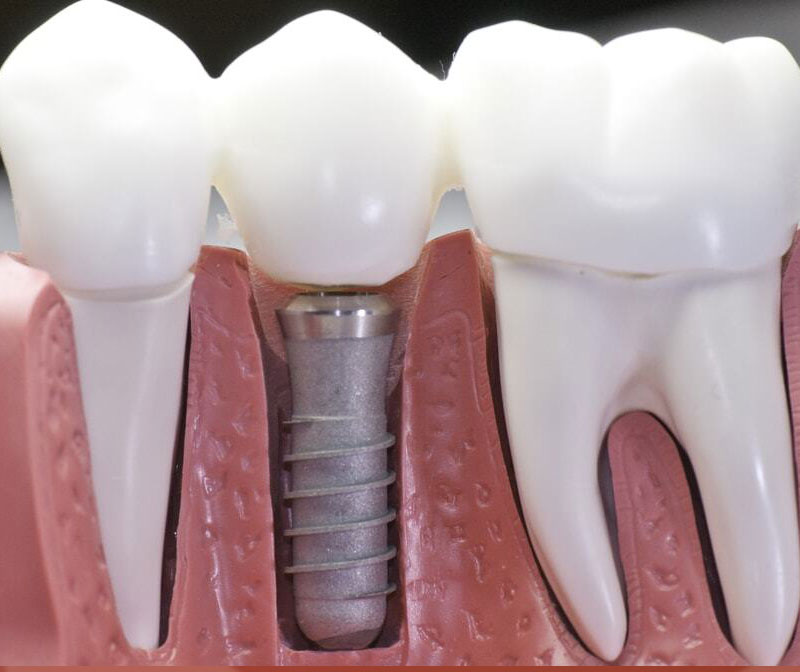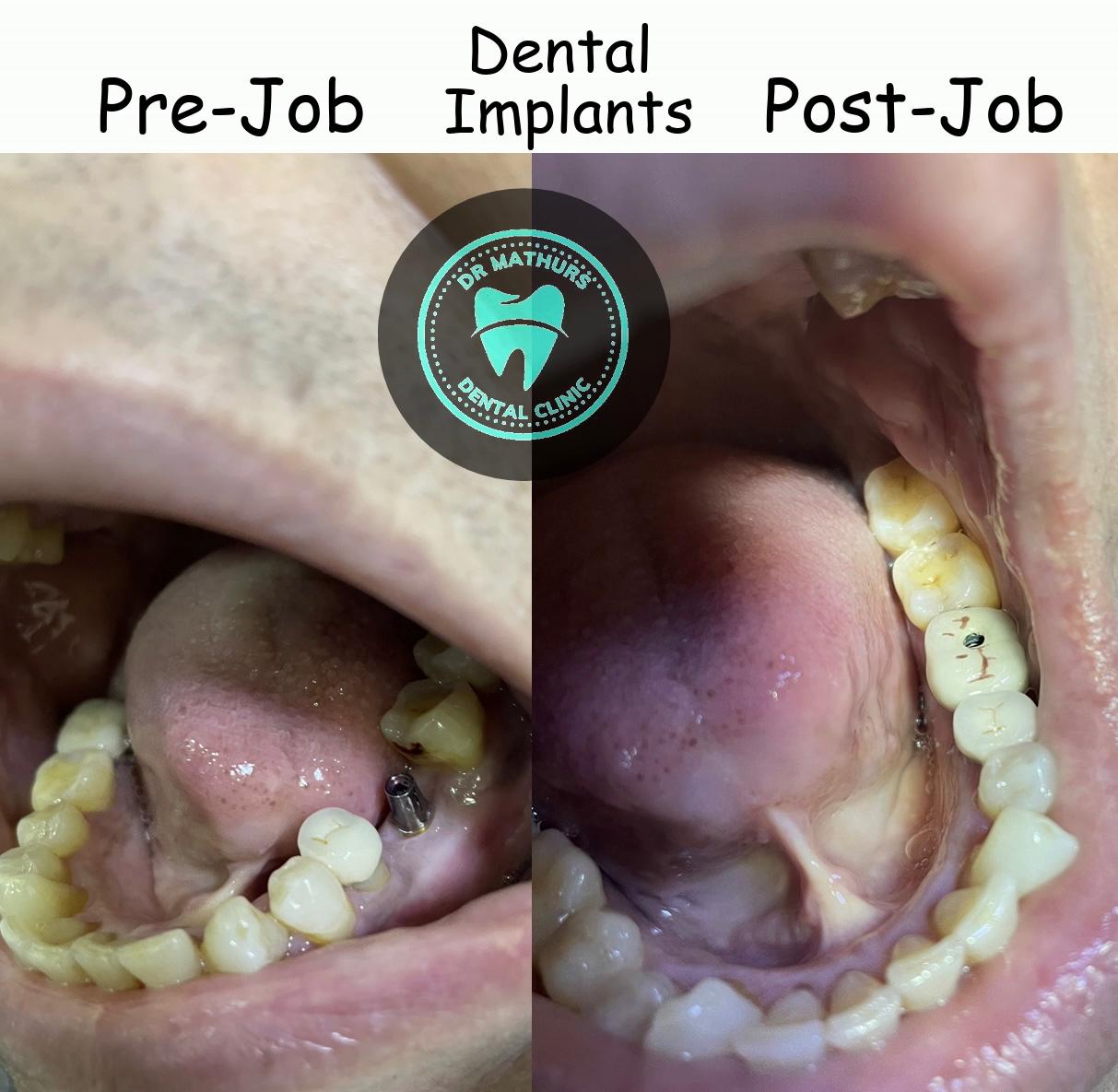Dental Implant

What is a Dental Implant?
Dental Implants are artificial substitutes for natural roots of teeth. When teeth are lost or missing, implants are used to anchor artificial teeth to the underlying jaw bone and hence closely mimic the natural dentition. They make it possible for people who cannot or will not wear a conventional denture to have very firm, stable and attractive teeth. It is usually made of titanium which is a biocompatible material i.e. our body accepts the metal comfortably and does not reject it. With a well-documented track record of more than 40 years, implants can replace one, more or all teeth. It is an alternative to conventional techniques such as "bridges" to replace missing teeth.
How many teeth can be replaced with implants?
If all the teeth are missing in a jaw, the complete set can be supported by 4 or 6 implants in that particular jaw, depending on the situtation. The number of implants to replace the missing teeth is determined on a patient-to-patient basis, depending on bite force generated, location of missing teeth, quality of jawbone etc.


Are implant teeth fixed or removable?
Implants are placed in the jawbone and are completely fixed and integrated to the jawbone. However the artificial teeth placed on top of the implant can be of the fixed or the removable type, but is commonly of the fixed type.
What are some of the benefits of dental implants?
The following are the most common symptoms of pulpal nerve damage. However, each individual may experience symptoms differently. Symptoms may include:
- They look and feel just like your own teeth.
Dental implants restore your confidence to speak, laugh, and chew with comfort and without worries of sudden dislodgement. - Implants preserve the integrity of facial structures.
- Implant-supported crowns and bridges do not need the grinding down of adjacent natural teeth.
When teeth are replaced using traditional tooth-supported bridges, the teeth on either side of the missing tooth are ground down so that the bridge can be cemented onto them. This tooth structure can never be replaced. - Implants replace the entire tooth and the missing root and hence is a freestanding restoration.
With Implants you can eat and chew better and hence is better for your health and nutrition. Patients with dentures often find themselves unable to eat certain foods, such as fruits and vegetables, which can compromise their nutrition. With dental implants, it is much easier to bite into and chew your favorite foods. - Implants gives you ease of cleansing
An implant-supported crown can be cleaned like your other natural teeth, i.e. brushing and flossing. - With Implants you can enjoy your food more.
Patients who wear an upper denture often have trouble in tasting food because the roof of the mouth is covered. With implant supported replacement teeth, it is not necessary to cover the roof of the mouth, and hence it is possible to enjoy the taste of foods better.
Do I have to get hospitalized for the procedure?
Hospitalization is the exception and not the rule. 95% of patients can be managed under local anesthesia in the dental clinic itself. Anxious patients are helped with nitrous oxide sedation or intra venous sedation techniques. Few patients, especially those requiring extensive bone grafting, will require general anesthesia. If you can tolerate a tooth extraction, you can cope with implantation.
Will I have pain and discomfort?
Pain and discomfort will be within tolerable limits. You will be given adequate medication after the procedure.
Who can give you an implant?
Any qualified dentist who has undergone specialist training in Implantology can perform implant procedures. Certain advanced implant procedures will need specialists such as oral & maxillofacial surgeon, prosthodontist or periodontist to do advanced implant procedures.
What is the success rate of implants?
The success rate for implants in a healthy individual with good oral hygiene is usually above 95 percent.
How do I care for implants?
Your overall health may affect the success rate of dental implants. Poor oral hygiene is a big reason why some implants fail. It is important to floss and brush around the implants at least twice a day, without metal objects. Your dentist will give you specific instructions on how to care for your new implants. Additional cleanings of up to four times per year may be necessary to ensure that you retain healthy gums.


Can anyone receive dental implants?
You must be in good health and have the proper bone structure and healthy gums for the implant to stay in place. People who are unable to wear dentures may also be good candidates. A dental implant can be had for comfort, confidence and aesthetics.
If you have teeth clenching or a grinding habit (bruxism), if your oral hygiene is poor, if you smoke heavily or if you have had radiation therapy to the jaw region the success rate for implants decreases.
Does implant treatment take a very long time?

Usually the treatment is done in two phases.
1st stage: The implant is placed in your jaw and the gums are closed over it.
2nd stage: After a healing period of 3 to 6 months the implant will be checked and measurements will be made for the artificial teeth (prosthesis) which will be placed over the implant.
However, new techniques such as 'Teeth in an hour' concept have become popular now, thanks to the combination of CT Imaging Technology and software for implant planning. In this computer aided implant placement, implants are placed as a 'key hole' procedure and artificial teeth are fixed immediately on the implant, within an hour. This 'teeth in an hour' concept however has a few pre-requisites such as normal volume of jawbone, good range of mouth opening and adequate primary stability of the implant.
How long will the entire procedure take?
This varies according to the individual and the jaw (upper or lower) in which the implant has been placed. Under normal circumstances it requires a 2-stage procedure with a period of 3 to 6 months in between to complete the entire process.
Can implants be done for elderly people?
Implant can be done in older age also. However certain issues such as osteoporosis (especially in post-menopausal women not on HRT), long history of heavy smoking, uncontrolled diabetes etc. are some issues to be kept in mind while planning on getting implants.
Can implants be done for children?
Implants are generally contra-indicated in growing ages. Continued jaw growth can lead to altered implant levels and difficulty in fabricating the artificial teeth. However, in certain conditions such as ectodermal dysplasia, implants can be given during childhood.
What is the new treatment called Zygoma Implant?
In some patients where the upper jawbone is not adequate enough to take implants, we graft the hipbone into the upper jaw and later place implants and fix artificial teeth. In the new Zygoma technique, bone grafting is not necessary. The Zygoma implant is a longer implant which is placed in the upper jaw bone extending up to the Zygoma (cheek bone) and artificial teeth are placed on it (without the need for extensive bone grafting procedure).

Call Us Today
+91 522 4004067, 8318280110

Quick Links
Help & Support
Useful Links
Working Hours
- Monday - Saturday : 10:00AM - 02:00PM
- Monday - Saturday : 04:00PM - 09:00PM
- Sunday : by appointment